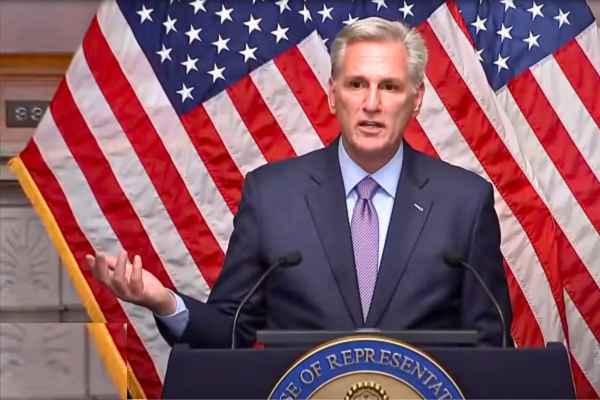In a surprising turn of events, the United States Congress is currently without a Speaker of the House. This unusual situation unfolded after Republican Kevin McCarthy, the former Speaker, was unexpectedly pushed out by members of his own party, marking the first time a Speaker was removed in this manner.
Ousting of Kevin McCarthy : What Led to It?
The tumultuous events leading to removal of Kevin McCarthy began with a shocking rebellion within the Republican Party. McCarthy’s position as Speaker was already tenuous due to the party’s narrow majority in the House of Representatives. When eight Republican rebels joined forces with the Democrats on Tuesday night, the Speaker’s fate was sealed in a close 216-210 vote.
The rebellion was spearheaded by Florida Congressman Matt Gaetz, who accused McCarthy of striking a “secret side deal” with President Biden regarding Ukraine aid. However, this incident was merely the culmination of a year-long feud between McCarthy and a right-wing faction within his party.
Kevin McCarthy with this Contentious Year
The discord began earlier in the year when McCarthy faced resistance from a group of Republican holdouts led by Gaetz during his bid for Speaker. These dissident Republicans questioned McCarthy’s commitment to conservative principles and were particularly concerned about government spending.
One key point of contention was the funding process for the government, which critics argued led to excessive spending. The traditional method involves passing individual appropriations bills, but Congress frequently resorts to continuing resolutions to avert government shutdowns. Gaetz and his group advocated for a return to “regular order” – approving the individual, annual spending bills to exercise more control and demand deeper spending cuts.
As the fiscal year deadline approached, McCarthy opted for a continuing resolution, angering the rebel Republicans who felt it contradicted their prior agreement. Gaetz warned that if McCarthy pursued this course with Democrats, he would move to oust him from the Speaker’s position. The clean continuing resolution passed with Democratic support, and Gaetz followed through on his threat.
Gaetz’s Motivations
The crux of Gaetz’s motivation for McCarthy’s removal appears to be rooted in several factors:

1. Government Spending and Fiscal Responsibility Gaetz and his faction were committed to fiscal responsibility and sought to end the practice of relying on continuing resolutions to fund the government. They believed that individual spending bills would enable more significant spending cuts.
2. Ukraine Aid Controversy Gaetz raised suspicions about McCarthy’s “secret deal” concerning Ukraine aid, a contentious issue within the Republican Party. McCarthy’s alleged negotiation with Democrats on Ukraine funding further fueled the discord.
3. Broken Promises The rebel Republicans accused McCarthy of failing to uphold their prior agreement. This included promises related to term limits, balanced budgets, transparency regarding the events of January 6, and subpoenas for Hunter Biden and other members of the Biden family.
4. Trust Issues A prevailing sentiment among those seeking McCarthy’s removal was a lack of trust in his leadership. They viewed McCarthy as untrustworthy, particularly after what they saw as his alignment with Democratic priorities and inconsistency in following their agreement.
Fallout: Pelosi’s Eviction and the Leadership Vacuum
Following McCarthy’s removal, Patrick McHenry of North Carolina assumed the role of interim Speaker. However, his powers are limited to specific duties outlined by House rules, preventing him from introducing legislation. Other potential contenders for the Speaker position include Louisiana Republican Steve Scalise and Minnesota Republican Tom Emmer.
In an unexpected move, former Democratic Speaker Nancy Pelosi was swiftly evicted from her office by McHenry, marking a significant departure from tradition. Normally, former Speakers provide their predecessors with access to “hideaway” offices near the House floor.
Pelosi, while mourning the loss of her close friend, Senator Dianne Feinstein, criticized the eviction as a breach of tradition, highlighting the urgency of addressing important matters for the American people.
Implications for the Nation
The absence of a permanent Speaker has immediate and long-term consequences. At least for a week, there is a leadership void at the highest levels of the U.S. government. Several crucial issues require immediate attention, including passing an annual budget, determining aid to Ukraine, and navigating the impeachment inquiry into President Joe Biden.
Furthermore, these developments have implications for the reputation of the U.S. government. Public confidence in the government has been dwindling, and this latest episode may exacerbate those sentiments. The perception that the political system is in disarray could further erode trust among Americans.
As the search for a new Speaker continues, the future direction of the House of Representatives remains uncertain. The resolution of this leadership crisis will undoubtedly shape the course of U.S. politics in the coming months and beyond.




